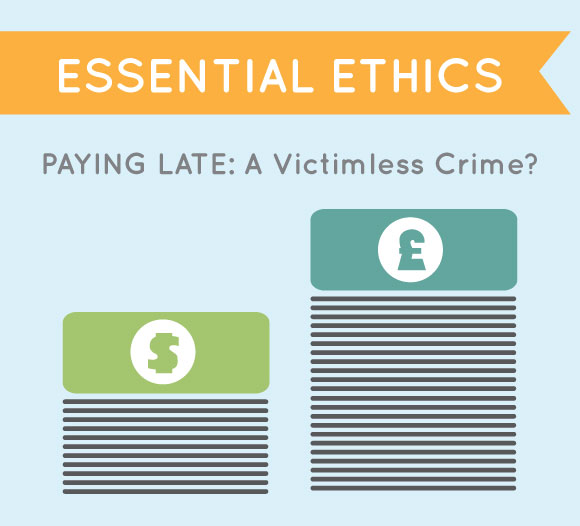

You’re expecting money from a major client, when you receive an email. “Looking for your cheque?” it reads. “Afraid we’ve changed our payment terms. You’ll be being paid every six weeks from now on. Hope you don’t mind. If you do, of course, we can always find someone else to supply us.” But what about the mortgage? And the car tax, the gas bill, the water rates? How will these monthly outgoings be paid if you suddenly don’t get paid?
Does this sound outrageous?
And yet it is the situation which many businesses find themselves in because of late payments by customers. Data from BACS – the UK bank automated clearance scheme – shows that in 2012, UK SMEs were owed over £36.4bn (over $60bn) in late payments. And the situation is not getting any better.
Paying suppliers late is an ethical issue which doesn’t receive the column inches of fraud or bribery or corruption, and yet it is a scandal which affects the lives of many. Late payments, for no valid or legitimate reason are unethical. They are an abuse of “power” and in essence bullying behaviour by customers which hold all the cards.
The ethical principle underlying any contract is trust. And trust comes from honesty, openness, fairness and mutual benefit. A reputation for trustworthiness can provide sustainable competitive advantage – it enables the organisation to attract and retain top talent and establish effective business partnerships and a loyal customer base.
But when the customer abuses a contract by late paying of invoices, trust is broken very quickly. In reality, suppliers, especially small ones, are rarely in a position to challenge their customers for fear of damaging the business relationship. Small businesses are often unable to walk away and look for another customer, especially if an existing one owes them significant money; and charging interest on the outstanding balance (which in UK law the supplier is entitled to do) is rarely used, out of fear of losing a customer.
Customers are paying their suppliers late to ease their own cash flow problems, pushing the financial risks onto their suppliers. To do so is an abuse of trust. There is a natural tension between a customer and a supplier which can result in the emergence of innovative solutions and mutual benefits. Far better in these straitened times for customers and suppliers to work together, to share the risk, to be truthful and honourable in their undertakings.
Paying suppliers late reflects the leadership and prevailing culture in the business. When it comes to ethics, businesses focus on employees potentially doing ‘bad’ things – fraud, bribery, corruption. When in reality, it is the seemingly little things – where we don’t see the outcome – which show the true colours of a company’s culture.
Strategic decisions such as changing contractual terms, or practices such as not paying on time – ‘losing invoices’; not passing invoices for payment or actioning requests for purchase orders – may seem to be ‘victimless crimes’. But during the 2008 recession it is estimated that 4,000 businesses failed as a direct result of late payments.
A culture of late payments is an example of how rotten corporate ethics can erode company culture from the inside. Because if suppliers are not treated with respect, then other stakeholders – customers, employees, investors, society at large – are not likely to be either.
An entrepreneur with an ethical approach to business practice will consider prompt payment of suppliers as an essential element of doing business ethically. To do so shows respect for the supplier relationship and is an example of the company being trustworthy.
Business Ethics is not rocket science: it can be summed up simply as “being nice to one another”. In today’s modern world it is easy to become detached from the lives we are connected to by the click of a button. Suppliers are not a number – that company has a name, with livelihoods attached to it. They should be thought of as people, as families, and given a human face. Late payments are not a victimless crime, but they are a preventable one.
 Katherine Bradshaw | Institute of Business Ethics
Katherine Bradshaw | Institute of Business Ethics
Katherine has more than a decade’s experience with IBE projects, including writing and editing the IBE Good Practice Guides on Speak Up Procedures and Surveying Staff on Ethical Matters. She devised the IBE E-Learning Tool Understanding Business Ethics and creates the scenarios for the IBE’s ethics training. Her most recent publication is Developing and Using Scenarios for Business Ethics Training.
Prior to joining the IBE she had a career in the music and comedy industry, with roles as general manager and press officer for, among others, Eddie Izzard, Robert Newman and the Guildford Festival. Katherine has an MA in Creative Writing and Personal Development from Sussex University. Outside the IBE, she is Treasurer for Kindlings, an outdoor play co-operative.
WEBSITE | FACEBOOK | @IBEUK
Ever struggled to have customers pay you on time-what were the consequences to you and your business? How did you try to solve the situation? Start a conversation in the comments!

